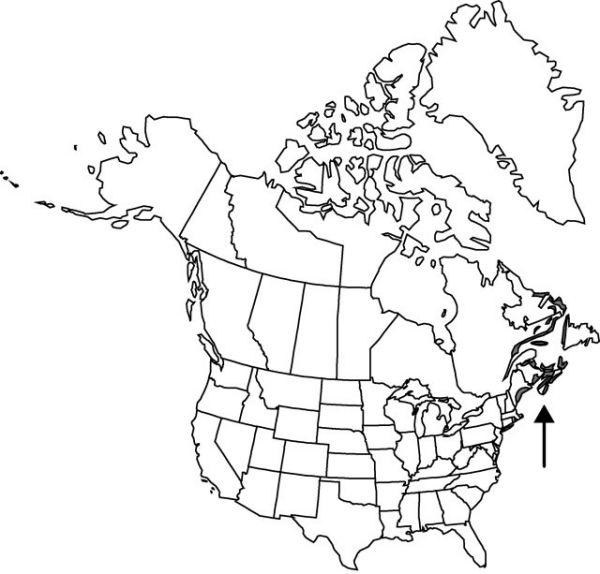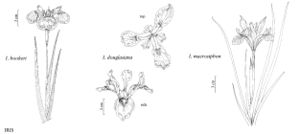Iris hookeri
in J. C. Loudon, Hort. Brit. ed. 2, 591. 1832.
Rhizomes many-branched, forming dense, cespitose clumps with many crowded fans with persistent old leaf bases, 3–5 × 1.3–1.5 cm. Stems several to many from a single clump of fans, simple, 0.5–6 dm. Leaves: basal erect or strongly ascending, blade 1–5.2 dm × 0.5–1.4 cm; cauline 2–4, proximal 2–3 similar to basal leaves, distalmost leaf occasionally borne nearly midway on stem, clasping, blade bracteiform, lanceolate, 0.5–1.5 dm. Inflorescence units 1–2-flowered; spathes herbaceous, lanceolate to oblong-ovate, 2.5–6 cm, firm, outer spathe apex acute, inner similar or scarious at apex. Flowers: perianth deep to pale blue or blue-violet; floral tube 0.5–0.75 cm; sepals broadly rounded, 2.5–4 cm wide, base strongly attenuate to claw, signal diffuse white basal patch; petals much reduced to insignificant, involute or tubular rudiments, 1–2 cm, apex with short bristle, mostly hidden by sepal bases; ovary green or flushed purple, acutely trigonal; style white with purple keel, 2–5 cm, crests overlapping, 2-lobed, subquadrate, margins coarsely serrate; stigmas rounded-triangular, margins entire; pedicel 2.5–4 cm. Capsules thin walled, trigonal, with rounded angles and grooved sides, 2–4 cm, apex blunt. Seeds in 2 rows per locule, dark brown with prominent white raphe, compressed-pyriform, 4–6 mm, lustrous. 2n = 38.
Phenology: Flowering Jun–Jul.
Habitat: Grassy headlands, upper borders of beaches, dunes, and other coast formations, within reach of ocean spray
Distribution

N.B., Nfld. and Labr., N.S., P.E.I., Que., Maine.
Discussion
Some authors still treat this taxon as Iris setosa var. canadensis, but others believe that it merits recognition as a separate species. I have seen I. hookeri flowering in its native habitat in both Nova Scotia and Prince Edward Island, and have examined dozens of herbarium specimens of both it and I. setosa, from which it is clearly distinct.
Selected References
None.
